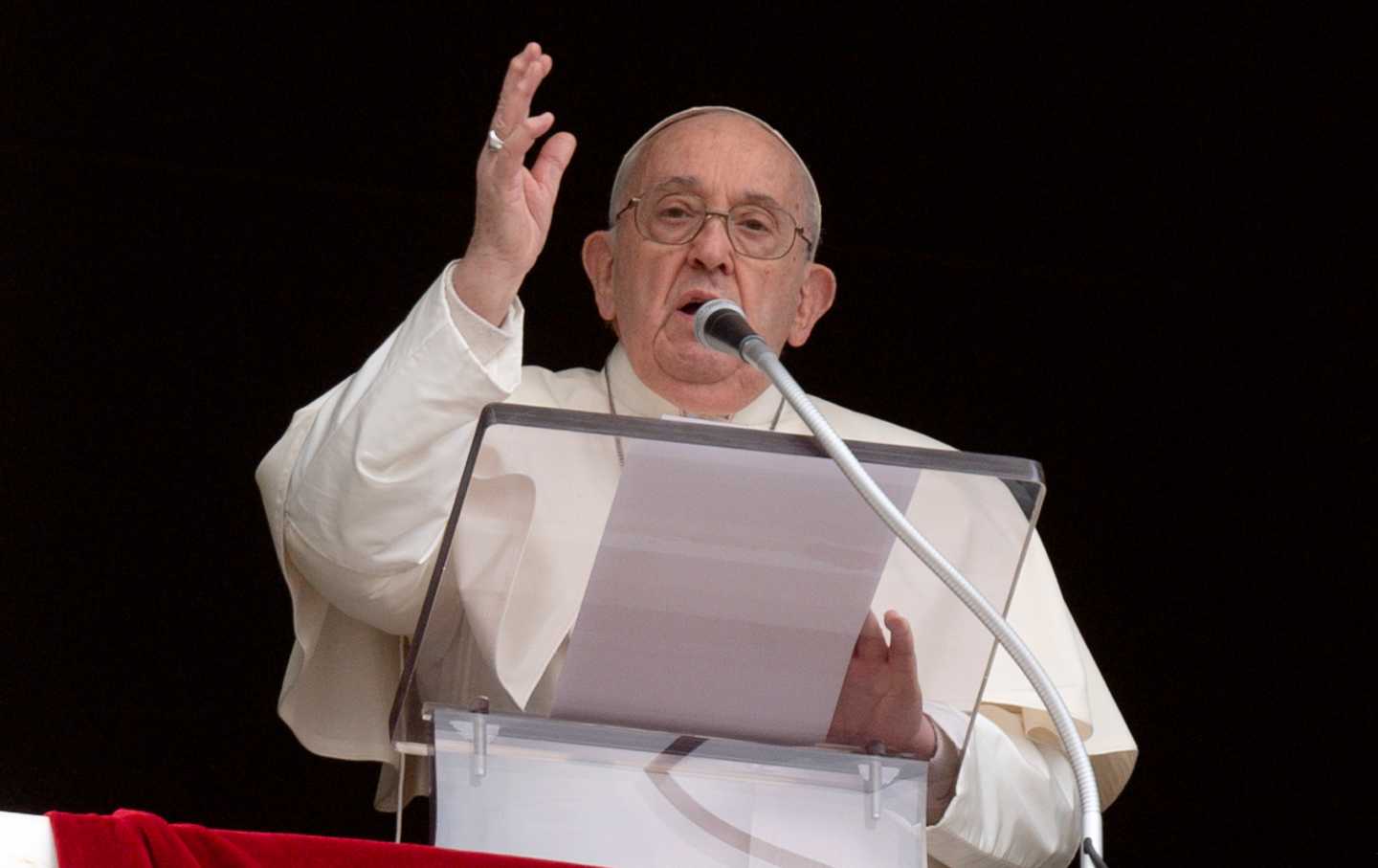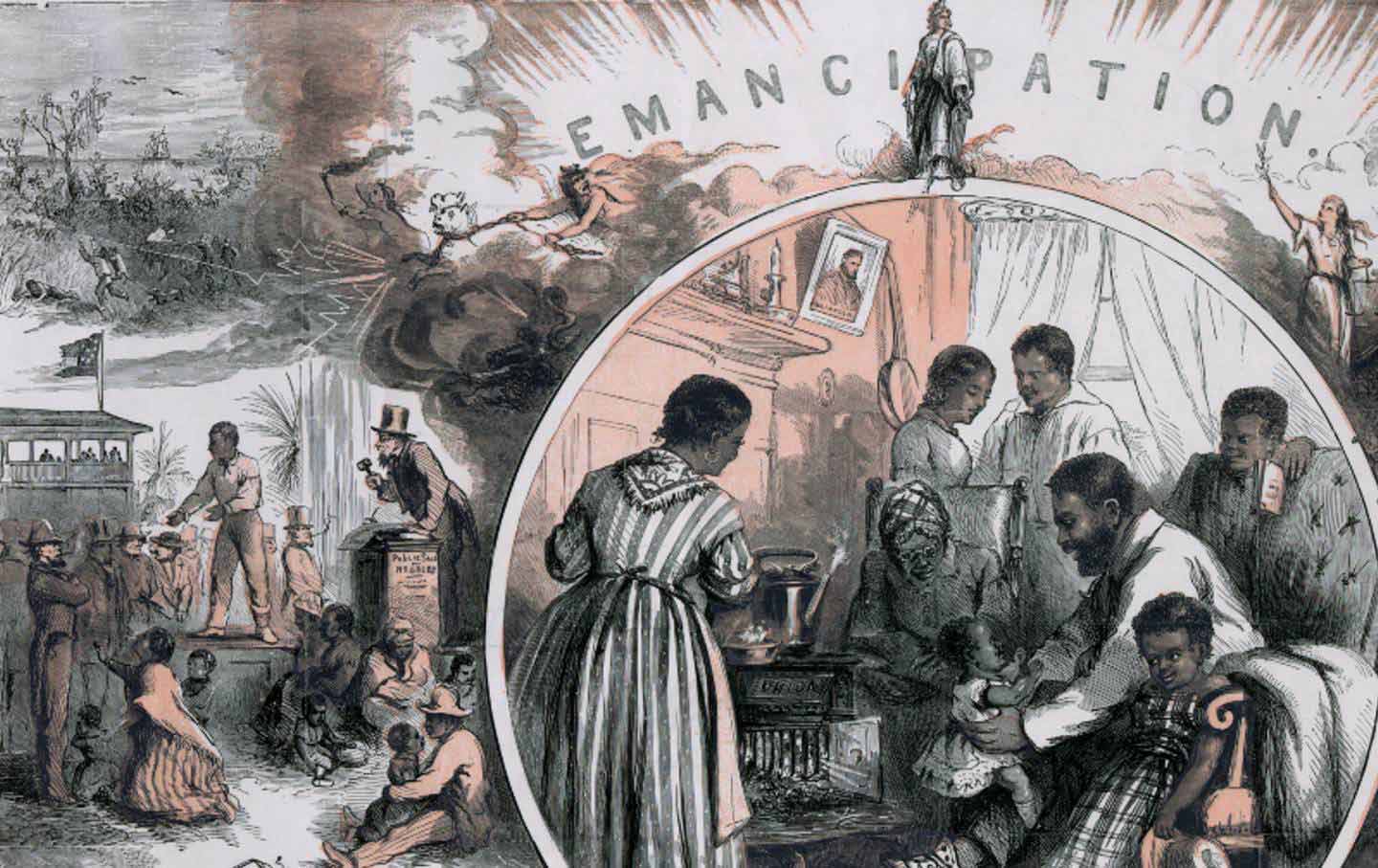The Vatican’s Bewildering New Declaration
It’s raised controversy with its unfortunate treatment of trans people. But its own arguments support their right to self-determination.

Pope Francis gives Regina Coeli address on Easter Monday.
(Vatican Media / Getty)Reading for the bottom line has become almost instinctual in US public discourse; we’re hungry for a digestible takeaway. When The New York Times recently announced that a new “Vatican Document Casts Gender Change and Fluidity as Threat to Human Dignity,” it’s safe to assume that most readers skimmed the article, if they even read past the headline. It’s the sort of headline that zeroes in on the personal interests of a significant part of the Times’ audience, addressing political hot buttons in language that, understandably, arouses strong feelings in the reader. When the Dicastery for the Doctrine of the Faith (DDF) released Dignitas Infinita on April 8, many had likely already made up their minds about the document, and it’s not clear how many proceeded to actually read it. But those who did, particularly those who have most reason to feel threatened by it, might have found themselves bewildered.
It was only after I had gotten to page 10 of the declaration without once encountering the word “gender” that I realized that, following the Times’ lead, in a very real sense, I was reading Dignitas Infinita backward. I was looking for what it had to say about my transgender and nonbinary friends, when the real point of the document is a prolonged theological and philosophical defense of the statement that the “dignity of every human being can be understood as infinite.” In effect, the “bottom line” approach to media tends to feed not only the divisiveness of contemporary civil discourse but, worse, our mutual incomprehension.
This isn’t to absolve the DDF. The most consistent criticism against the document is completely accurate: It shows no familiarity with the actual lives of transgender people. Longtime Vatican observer Gerard O’Connell points out that Pope Francis meets frequently with trans people. But it’s one thing to welcome poor trans women to the pope’s Wednesday audiences—many of whom are foreign-born and engage in sex work—and support them in their needs, and another thing to actually listen to them, much less listen to trans people who are not poor, not immigrants, who are engaged in “respectable” professions, and are met as social equals. Listening, after all, is not simply letting someone else speak in your presence. To claim, as the document does, that “personal self-determination” with regard to gender “amounts to a concession to the age-old temptation to make oneself God” not only grossly oversimplifies what most transgender people would actually say about themselves; it actually engages in what amounts to speculative fiction about their spiritual lives.
Even the olive branches offered in the document are weak. The section on gender theory starts by affirming, in words that recall the catechism, that the church “wishes, ‘first of all, to reaffirm that every person, regardless of sexual orientation, ought to be respected in his or her dignity and treated with consideration, while ‘every sign of unjust discrimination’ is to be carefully avoided, particularly any form of aggression and violence.” (The interior quotes are from Francis’s 2016 Amoris Laetitia.) Aside from the apparent conflation of sexual orientation with gender identity and expression, the phrase “unjust discrimination” suggests that the authors of that statement believe there can be “just” discrimination when it comes to LGBTQ individuals. This is especially dangerous, given the raft of recent legislation in the US targeting queer people. Doesn’t the denial of gender-affirming care and civil recognition of transgender lives constitute a kind of “aggression and violence”? Not to mention the possibility that someone who knows only that the Vatican, once again, has condemned people who do not conform to gender norms as “threats to human dignity” uses it as a pretext to engage in the kind of violence Dignitas Infinita condemns.
But to reject and ignore the declaration completely would be to miss the point. To complain that Dignitas Infinita doesn’t take the experiences of trans people seriously and misinterprets their actions is to say it hasn’t taken its own argument seriously enough. It’s to say that respecting the dignity of the human person means recognizing that they know themselves better than any third party does—even the pope. It’s to say that a trans individual can discern, in words of John Paul II, which the document cites, that their “physical and mental integrity” is in some sense already impaired, and that transition is an act of repairing that integrity that demands respect. It’s to say that, from its earliest days, the church has recognized that the creation stories in Genesis demand a careful, figurative interpretation—including a figurative interpretation of the statement “in the image of God he created them; male and female he created them.”
I can only say these things in so far as I have read, understood, and share the document’s claim that “every human person possesses an infinite dignity.”
That claim, with its unusual use of the word “infinite,” is at the heart of a text that, in the eyes of many people, seems to sprawl. Alongside “gender theory,” “sex change” (terms like “gender-affirming care” are decidedly absent), “abortion,” and “surrogacy,” Dignitas Infinita singles out “poverty,” “war,” “the travail of migrants,” “human trafficking,” “sexual abuse,” “violence against women,” “euthanasia and assisted suicide,” “the marginalization of people with disabilities,” and “digital violence” as “violations of human dignity.” If that list reminds you of those tests we took as kids, the ones where you were supposed to decide “which of these things is not like the others,” it’s at least partially because Catholic Social Teaching famously defies the tidy left/right binary we’ve come to take for granted in US political discourse.
But it’s also the direct result of Francis’s intervention in the drafting of Dignitas Infinita. As explained in a foreword to the declaration, the document was originally conceived five years ago, when the DDF was still known as the Congregation of the Doctrine of the Faith, under the leadership of Cardinal Luis Ladaria. It’s not clear what the original scope of the document was intended to be, though O’Connell suggests that it might have been narrowly focused on gender theory and surrogacy. What is clear is that when a version of the document was finally submitted for Francis’s approval last November, he insisted (in the words of the text’s introduction) that “more attention be given to the grave violations of human dignity in our time,” explicitly singling out many of the issues listed above.
He also specified that this final draft be carried out “in light of the encyclical Fratelli Tutti.” That encyclical, subtitled “on Fraternity and Social Friendship,” addresses the problems of social fragmentation. It’s clear that while Dignitas Infinita makes constant reference to “religious” sources, it also makes a significant effort to engage those outside the church by appealing to “reason” and referring to the United Nations Declaration on Human Rights. While this is probably not enough to convince anyone of the justice of its condemnation of gender theory and gender affirmation, it might be enough to engage curious readers. Unlike other recent declarations on issues of sexuality, it does not enjoin any particular action, but is intended “to offer some points of reflection that can help us maintain an awareness of human dignity.”
Reflection sometimes seems like the hardest thing to do in these times. It requires time and means balancing personal interest with the common good. It means taking seriously the interest of others without sacrificing one’s own “infinite dignity”—however understood. Admittedly, when it comes to transgender people, Dignitas Infinita fails to do this, and fails spectacularly.
Asking transgender people to engage with the rest of the document is asking a lot. But the “bottom line” approach offered by so much of the media only feeds our sense of social fragmentation, and as the left/right binary splinters in the post-Trump era, there’s a particular urgency in finding common cause where we can, if only so that we can protect ourselves and each other. We might even persuade those who disagree with us that they won’t lose everything if they concede our point on the realities of queer lives.
This might seem idealistic, but the alternatives are almost too frightening to consider.
We cannot back down
We now confront a second Trump presidency.
There’s not a moment to lose. We must harness our fears, our grief, and yes, our anger, to resist the dangerous policies Donald Trump will unleash on our country. We rededicate ourselves to our role as journalists and writers of principle and conscience.
Today, we also steel ourselves for the fight ahead. It will demand a fearless spirit, an informed mind, wise analysis, and humane resistance. We face the enactment of Project 2025, a far-right supreme court, political authoritarianism, increasing inequality and record homelessness, a looming climate crisis, and conflicts abroad. The Nation will expose and propose, nurture investigative reporting, and stand together as a community to keep hope and possibility alive. The Nation’s work will continue—as it has in good and not-so-good times—to develop alternative ideas and visions, to deepen our mission of truth-telling and deep reporting, and to further solidarity in a nation divided.
Armed with a remarkable 160 years of bold, independent journalism, our mandate today remains the same as when abolitionists first founded The Nation—to uphold the principles of democracy and freedom, serve as a beacon through the darkest days of resistance, and to envision and struggle for a brighter future.
The day is dark, the forces arrayed are tenacious, but as the late Nation editorial board member Toni Morrison wrote “No! This is precisely the time when artists go to work. There is no time for despair, no place for self-pity, no need for silence, no room for fear. We speak, we write, we do language. That is how civilizations heal.”
I urge you to stand with The Nation and donate today.
Onwards,
Katrina vanden Heuvel
Editorial Director and Publisher, The Nation
More from The Nation

When It Comes to Public Health, We Need to Tap Into People, Not Pundits When It Comes to Public Health, We Need to Tap Into People, Not Pundits
The future of our health under Trump is going to be bleak. But the solution lies in our communities, not individual personalities.

Mr. Scarborough Goes to Mar-a-Lago Mr. Scarborough Goes to Mar-a-Lago
The hosts of Joe Biden’s favorite political talk show have quickly pivoted to kissing the ring of the incoming president.

Watching a Parallel Media Try to Make Trump the Big Sports Story Watching a Parallel Media Try to Make Trump the Big Sports Story
The president-elect did not dominate the world of sports this weekend, but Fox News and Internet tabloids are inventing new realities.

The First Amendment Will Suffer Under Trump The First Amendment Will Suffer Under Trump
Given what’s heading our way, we need a capacious view and robust defense of the First Amendment from all quarters.

Slavery in an Age of Emancipation Slavery in an Age of Emancipation
Robin Blackburn’s sweeping history of slavery and freedom in the 19th century.

How Wisconsin Lost Control of the Strange Disease Killing Its Deer How Wisconsin Lost Control of the Strange Disease Killing Its Deer
Despite early containment efforts, chronic wasting disease has been allowed to run rampant in the state. That’s bad news for all of us.


